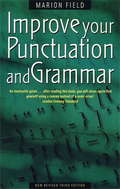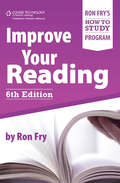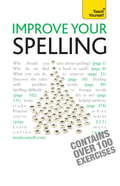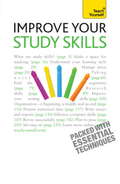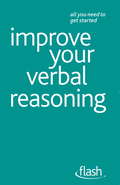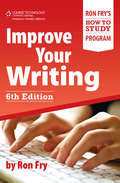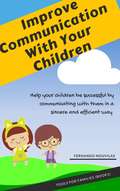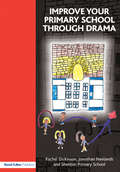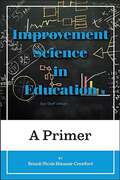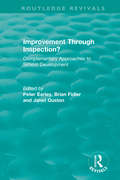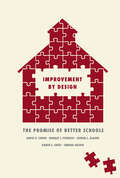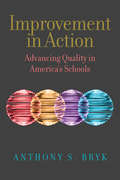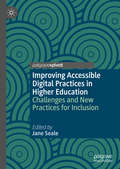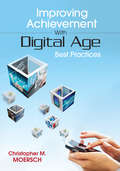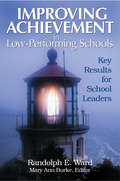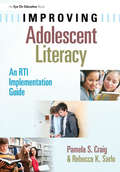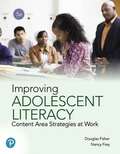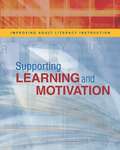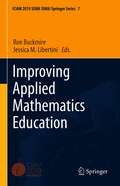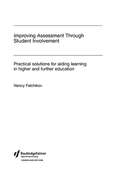- Table View
- List View
Improve Your Punctuation and Grammar
by Marion FieldMaster the essentials of the English language and write with greater confidence.
Improve Your Punctuation and Grammar
by Marion FieldMaster the essentials of the English language and write with greater confidence.
Improve Your Reading
by Ron FryHelp your students discover the practical solution to their reading frustrations, with Improve Your Reading. Written by bestselling author and education advocate Ron Fry, this book avoids gimmicks and tricks in favor of proven strategies that will help your students better retain and comprehend what they've read in any textbook, in any course, at any academic level. Endlessly adaptable to each student's individual learning needs, the text focuses on fundamental skills students can carry beyond the classroom.
Improve Your Reading (Ron Fry's How to Study Program #5)
by Ron FryProven strategies for better reading skills—from comprehension, focus, and retention to overcoming challenges such as ADD. Whether it’s for education or enjoyment, reading can be challenging. Understanding and remembering what you’ve read, and keeping focus and concentration when you have to read long or difficult texts, takes certain skills. Luckily, those skills can be learned and improved. In Improve Your Reading, education expert Ron Fry offers practical solutions to the reading-related frustrations all readers—and students—face. No gimmicks, no tricks, just proven techniques for any course, any academic level, any situation, and anyone in need of the essential tools to succeed in the classroom and beyond. You’ll discover:Basic, necessary study skillsHow to read with a purposeHow to focus on the main ideaHow to overcome the challenges of technical textsThe art of becoming a critical readerWays to retain informationAdvice on how to start building your own libraryTips for reading with ADD or other challengesIdeas for parents to help their childrenWays for teachers to encourage their students Reading is the key to success—and this clear, simple guide is the key to reading!
Improve Your Spelling: Teach Yourself (Teach Yourself General Ser.)
by Elspeth SummersThis practical guide to spelling will help you to feel more confident by teaching you simple strategies to boost your ability. You'll learn which words are commonly misspelt and how to avoid falling into these traps. With simple rules and guidelines to follow, you'll discover when it's acceptable to misspell and when it's not, and you will finally learn how to enjoy - rather than fear - the written word. With plenty of exercises, crosswords and games to practice and perfect your skills, your spelling will never let you down again. NOT GOT MUCH TIME?One, five and ten-minute introductions to key principles to get you started.AUTHOR INSIGHTSLots of instant help with common problems and quick tips for success, based on the authors' many years of experience.TEST YOURSELFTests in the book and online to keep track of your progress.EXTEND YOUR KNOWLEDGEExtra online articles at www.teachyourself.com to give you a richer understanding of spelling.FIVE THINGS TO REMEMBERQuick refreshers to help you remember the key facts.TRY THISInnovative exercises illustrate what you've learnt and how to use it.
Improve Your Spelling: Teach Yourself (Teach Yourself General)
by Elspeth SummersThis practical guide to spelling will help you to feel more confident by teaching you simple strategies to boost your ability. You'll learn which words are commonly misspelt and how to avoid falling into these traps. With simple rules and guidelines to follow, you'll discover when it's acceptable to misspell and when it's not, and you will finally learn how to enjoy - rather than fear - the written word. With plenty of exercises, crosswords and games to practice and perfect your skills, your spelling will never let you down again. NOT GOT MUCH TIME?One, five and ten-minute introductions to key principles to get you started.AUTHOR INSIGHTSLots of instant help with common problems and quick tips for success, based on the authors' many years of experience.TEST YOURSELFTests in the book and online to keep track of your progress.EXTEND YOUR KNOWLEDGEExtra online articles at www.teachyourself.com to give you a richer understanding of spelling.FIVE THINGS TO REMEMBERQuick refreshers to help you remember the key facts.TRY THISInnovative exercises illustrate what you've learnt and how to use it.
Improve Your Study Skills: Teach Yourself (Teach Yourself General Ser.)
by Bernice WalmsleyWhether you are embarking on a new course, undertaking professional or vocational training or simply want to pass your driving test, you will find this comprehensive and practical guide extremely useful. Full of information on how to maximize your study time, the book will enable you to think in a critical manner, write strong essays, reports and presentations and balance your studies with other commitments such as work or family life. It also offers hints on good revision and exam techniques. Authoritative and very readable, Improve Your Study Skills gives you the tools to succeed.NOT GOT MUCH TIME?One, five and ten-minute introductions to key principles to get you started.AUTHOR INSIGHTSLots of instant help with common problems and quick tips for success, based on the author's many years of experience.TEST YOURSELFTests in the book and online to keep track of your progress.EXTEND YOUR KNOWLEDGEExtra online articles at www.teachyourself.com to give you a richer understanding of study skills.FIVE THINGS TO REMEMBERQuick refreshers to help you remember the key facts.TRY THISInnovative exercises illustrate what you've learnt and how to use it.
Improve Your Verbal Reasoning: Flash
by Jeremy Kourdi Julie KourdiThe books in this bite-sized new series contain no complicated techniques or tricky materials, making them ideal for the busy, the time-pressured or the merely curious. In just 96 pages, Improve your Verbal Reasoning helps you to practice all sorts of advanced verbal reasoning tests and build your confidence in advance of attending that job interview, assessment centre or bid for promotion.
Improve Your Verbal Reasoning: Flash
by Jeremy Kourdi Julie KourdiThe books in this bite-sized new series contain no complicated techniques or tricky materials, making them ideal for the busy, the time-pressured or the merely curious. In just 96 pages, Improve your Verbal Reasoning helps you to practice all sorts of advanced verbal reasoning tests and build your confidence in advance of attending that job interview, assessment centre or bid for promotion.
Improve Your Writing
by Ron FryFrom selecting a topic and conducting research to developing an outline, writing drafts, proofreading, and more, Improve Your Writing takes you step-by-step through the creation of a successful research paper. Applicable to any kind of writing addressing any subject matter, author Ron Fry's fundamental and systematic approach goes beyond one size fits all checklists to offer real advice that can be adapted according to your individual needs and situations. Ideal for anyone hoping to establish essential research, organization, and writing skills, the text empowers you to excel in school, on essay tests, and in life.
Improve communication with your children
by Fernando Nouvilas Sue MataHelp your child have success getting to know him and communicating with him in a honest and effective way. And, even if it did exist it doesn't have to be the most ideal for our child: every person is different and what can work for one, may not work for another. What we can assure you is taht we must help our child be happy and to become a responsible adult. For that we must acquire a group of abilities that will help us act in correct way. In the series of books, "Tools for families" We will help you with the exciting labor of educating our children and seeing them grow happy. In the first issue we will address the most fundamental: know our children as they really are: How to improve communication at home How to know their friends How to know what they do on the internet and social media How to establish a comunication based on honesty and trust...
Improve your Primary School Through Drama
by Rachel Dickinson Jonothan NeelandsUsing drama right across the curriculum to improve and invigorate teaching and learning, this book provides whole school and individual class approaches underpinned by sound theory and implemented in a real primary school. Explanations and examples are given in a clear and accessible style, and links are made to The National Strategy. The book illustrates a wide range of strategies that show how drama can help with: behavior inclusion and multicultural issues improving the whole school ethos involving parents and governors. This user-friendly and comprehensive text is the perfect support tool for teachers and managers ready to improve their school regardless of whether they're approaching drama for the first time or are already passionate about it.
Improvement Science in Education: A Primer (Improvement Science in Education and Beyond)
by Brandi Nicole Hinnant-Crawfordmprovement Science in Education: A Primer provides a comprehensive overview of improvement science as a framework to guide continuous improvement and reconceptualizes improvement by centering equity and justice as the purpose of improvement. This Primer is designed to introduce improvement science, a methodology with origins in manufacturing, engineering and healthcare, to educational audiences. The book first explores the philosophical and methodological foundations of improvement science, juxtaposing it with traditional forms of research so that clear distinctions can be drawn. Chapters in the latter half of the book introduce the principles of improvement, give guidance and tools for operationalizing the principles in practice, and conclude with questions to ensure you are improving with equity in mind. Constantly reminding readers to think about who is involved and impacted, the Primer makes improvement science accessible to novices and adds critical dimensions for experienced practitioners to consider.
Improvement Through Inspection?: Complementary Approaches to School Development (Routledge Revivals)
by Peter Earley Janet Ouston Brian FidlerOriginally published in 1996, the title of this book poses the question whether the motto of the Office for Standards in Education was an apt statement of its effects in practice. Beginning with the state of knowledge about OFSTED’s early impact, the Editors review the range of complementary approaches to school improvement – most of them driven by the schools themselves – that were in operation, alongside the OFSTED system of inspection at the time. The major part of the book is taken up with the main ‘quality initiatives’ that were at work in primary and secondary schools – including Investors in People, Deming, TQM, partnerships, professional competence, strategic planning and effective governorship. Each chapter examines critically – sometimes with the aid of case studies of good practice – the benefits such approaches might bring to schools in their attempts to raise standards. The book is a companion to OFSTED Inspections: The Early Experience by the same Editors, published and reissued simultaneously.
Improvement by Design: The Promise of Better Schools
by David K. Cohen Donald J. Peurach Joshua L. Glazer Karen E. Gates Simona GoldinOne of the great challenges now facing education reformers in the United States is how to devise a consistent and intelligent framework for instruction that will work across the nation’s notoriously fragmented and politically conflicted school systems. Various programs have tried to do that, but only a few have succeeded. Improvement by Design looks at three different programs, seeking to understand why two of them—America’s Choice and Success for All—worked, and why the third—Accelerated Schools Project—did not. The authors identify four critical puzzles that the successful programs were able to solve: design, implementation, improvement, and sustainability. Pinpointing the specific solutions that clearly improved instruction, they identify the key elements that all successful reform programs share. Offering urgently needed guidance for state and local school systems as they attempt to respond to future reform proposals, Improvement by Design gets America one step closer to truly successful education systems.
Improvement in Action: Advancing Quality in America's Schools (Continuous Improvement in Education Series)
by Anthony S. BrykImprovement in Action, Anthony S. Bryk&’s sequel to Learning to Improve, illustrates how educators have effectively applied the six core principles of continuous improvement in practice. The book highlights relevant examples of rigorous, high-quality improvement work in districts, schools, and professional development networks across the country. The organizations featured in the book have addressed, with remarkable results, long-standing inequitable educational outcomes in high school graduation rates, college readiness, and absenteeism. The cases emphasize the measures the educators took and the thinking that motivated their actions. Bryk describes how improvers, working in different contexts and confronting different problems, used select principles, tools, and methods to make improvement come to life. Brief analytic reflections are embedded throughout the narratives, and each chapter concludes with an analysis of a set of larger lessons illuminated by the organization&’s story. Taken as a set, these examples offer readers valuable insights about the actual dynamics of doing improvement work.Improvement in Action, paired with Learning to Improve, provides readers with a comprehensive understanding of the practice, method, and theory of large-scale continuous improvement in education.
Improving Accessible Digital Practices in Higher Education: Challenges and New Practices for Inclusion
by Jane SealeThis book examines the role played by technologies in removing the disadvantage experienced by students with disabilities in higher education. Addressing five key themes, the editor and contributors explore the practices required of stakeholders within higher education institutions to mediate successful and supportive relationships between disabled learners and their technologies. Ultimately, the book argues that practice in the fields of disability, ICT and higher education is still not providing consistent and widespread positive learning experiences to students with disabilities. In order to address this situation, the field needs to creatively integrate knowledge gained through both research and practice, and to re-imagine what is needed for ICT to meaningfully contribute to a reduction in disadvantage for disabled students. This book will be of interest and value to scholars of disability studies, education and accessibility, and educational technologies.
Improving Achievement With Digital Age Best Practices
by Christopher M. MoerschConnect Common Core, inquiry, and technology! While technology ushers in exciting and innovative educational opportunities, finding best practices for complete integration remains a challenge. In this practical resource, educators will discover a roadmap for implementing digital age best practices. With discussions on how to promote networked collaboration, bolster purposeful inquiry, and anchor student decision-making and learning with digital-age tools, these research-based strategies deliver: A user-friendly road map for digital transition into new Common Core Standards Lesson plans, benchmarks, and instructional units to bridge the link between 21st century skills, Common Core Standards, and student achievement Practical tips for classroom, building, and district implementation Tools and guidance for successful PLCs
Improving Achievement in Low-Performing Schools: Key Results for School Leaders
by Dr Randolph E. Ward Mary Ann BurkeFocus on improving achievement, aligning teaching and learning with student performance, creating secure facilities, and forging links with the community with this excellent resource.
Improving Adolescent Literacy: An RTI Implementation Guide
by Pamela Craig Rebecca SarloMeet your students' literacy needs with this book from Pamela Craig and Rebecca Sarlo. Literacy experts Craig and Sarlo explain how the implementation of a Problem Solving/Response to Intervention framework in grades 4-12 will help all students greatly improve their reading skills. Written for secondary teachers and administrators, the book shows how to use PS/RTI as a tool for establishing achievable goals identifying barriers developing action plans monitoring the effectiveness of the intervention Each chapter includes research-based resources and practical guidance to ensure success.
Improving Adolescent Literacy: Content Area Strategies at Work
by Douglas Fisher Nancy FreyStraightforward, affordable, and practical, Improving Adolescent Literacy gives all middle and secondary school teachers instructional routines that will allow them to develop the content literacy skills of their students. Chapter-opening vignettes from actual classrooms show readers effective teaching in action and give them a look at how the chapter’s instructional approach works within content area teaching. Research-based rationales for each strategy follow the vignettes and provide an in-depth look at how to implement the strategy, along with examples of each strategy across the curriculum. In this 5th Edition, the authors provide new classroom examples from their colleagues across the disciplines as well as new instructional routines that have been researched and validated since the publication of the last edition. Also, this edition has been re-organized, adding three new chapters, to focus on the ways in which teachers can use reading, writing, speaking, and listening in their classes, emphasizing reading and comprehending texts, creating graphic organizers, developing vocabulary knowledge, and writing to learn.
Improving Adult Literacy Instruction
by Committee on Learning Sciences: Foundations Applications To Adolescent Adult LiteracyMore than an estimated 90 million adults in the United States lack the literacy skills needed for fully productive and secure lives. The effects of this shortfall are many: Adults with low literacy have lower rates of participation in the labor force and lower earnings when they do have jobs, for example. They are less able to understand and use health information. And they are less likely to read to their children, which may slow their children's own literacy development. At the request of the U. S. Department of Education, the National Research Council convened a committee of experts from many disciplines to synthesize research on literacy and learning in order to improve instruction for those served in adult education in the U. S. The committee's report, Improving Adult Literacy Instruction: Options for Practice and Research, recommends a program of research and innovation to gain a better understanding of adult literacy learners, improve instruction, and create the supports adults need for learning and achievement. Improving Adult Literacy Instruction: Developing Reading and Writing, which is based on the report, presents an overview of what is known about how literacy develops the component skills of reading and writing, and the practices that are effective for developing them. It also describes principles of reading and writing instruction that can guide those who design and administer programs or courses to improve adult literacy skills. Although this is not intended as a "how to" manual for instructors, teachers may also find the information presented here to be helpful as they plan and deliver instruction.
Improving Adult Literacy Instruction: Supporting Learning and Motivation
by M. ChiangVirtually everyone needs a high level of literacy in both print and digital media to negotiate most aspects of 21st century life-succeeding in a competitive job market, supporting a family, navigating health information, and participating in civic activities. Yet, according to a recent survey estimate, more than 90 million adults in the United States lack the literacy skills needed for fully productive and secure lives. At the request of the U. S. Department of Education, the National Research Council convened a committee of experts from many disciplines to synthesize research on literacy and learning in order to improve instruction for those served in adult education in the U. S. The committee's report, Improving Adult Literacy Instruction: Options for Practice and Research, recommends a program of research and innovation to gain a better understanding of adult literacy learners, improve instruction, and create the supports adults need for learning and achievement. Improving Adult Literacy Instruction: Supporting Learning and Motivation, which is based on the report, describes principles of effective instruction to guide those who design and administer adult literacy programs and courses. It also explores ways to motivate learners to persist in their studies, which is crucial given the thousands of hours of study and practice required to become proficient. The booklet concludes with a look at technologies that show promise for supporting individual learners and freeing busy adults from having to be in a particular place in order to practice their literacy skills. Although this booklet is not intended as a "how to" manual for instructors, teachers may also find the information presented here to be helpful as they plan and deliver instruction.
Improving Applied Mathematics Education (SEMA SIMAI Springer Series #7)
by Ron Buckmire Jessica M. LibertiniThis book presents various contemporary topics in applied mathematics education and addresses both interested undergraduate instructors and STEM education researchers. The diverse set of topics of this edited volume range from analyzing the demographics of the United States mathematics community, discussing the teaching of calculus using modern tools, engaging students to use applied mathematics to learn about and solve problems of global significance, developing a general education course for humanities and social sciences students that features applications of mathematics, and describing local mathematical modeling competitions and their use in providing authentic experiences for students in applying mathematics to real world situations. The authors represent diversity along multiple dimensions of difference: race, gender, institutional affiliation, and professional experience.
Improving Assessment through Student Involvement: Practical Solutions for Aiding Learning in Higher and Further Education
by Nancy FalchikovThe assessment of students an activity central to the role of any professional in further and higher education, and is an area that is the subject of constant innovation and debate. This book provides a scholarly account of the many facets of assessment, with a particular focus on student involvement. Peer and self-assessment are powerful assessment tools to add to the existing tutor-based methods of assessment and feedback, and this book is a comprehensive guide to the the methods and issues involved.Practical and accessible in style, yet grounded in research and rich in evidence-based material, Improving Assessment Through Student Involvement will be valued by all FE or HE professionals wanting to enhance both the effectiveness and quality of their assessment methods.
